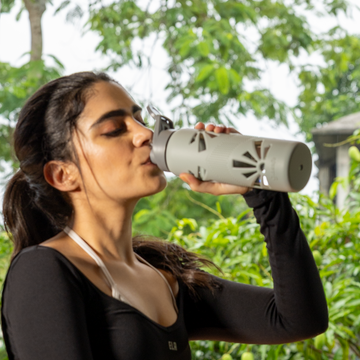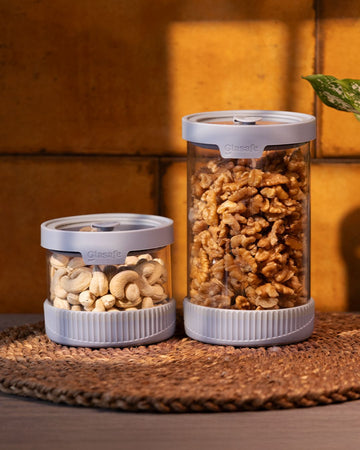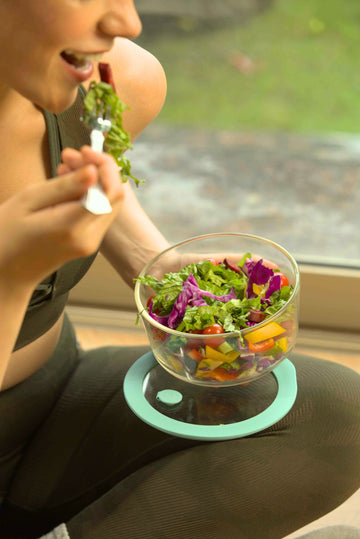Pregnancy is a beautiful journey that changes a woman’s life in so many ways. It is filled with excitement, emotions, learning, and making choices that are not just about you anymore, but also about the life growing inside you. From choosing the right foods to the right products, every choice suddenly becomes even more important.
Staying hydrated is important for you and your baby. It’s about staying hydrated and the kind of bottle you use. Proper hydration helps with healthy digestion and carries nutrients to your baby.
Your journey deserves attention. Your baby deserves protection. Switching from plastic to a safer option, like Glasafe’s borosilicate glass bottles with protective silicone sleeves that are safe, BPA-free, durable, free of harmful chemicals, and easy to clean, makes it safe for you and your baby.
This Mother’s Day, we are taking a moment to address this concern and help pregnant mothers make safe and more informed choices. After all, you are not just waiting, you are preparing, nourishing, and creating life. And we’re here to support you throughout this journey.
Can Pregnant Women Drink From Plastic Bottles?
Plastic bottles are considered harmful because they contain harmful chemicals like BPA or microplastics that can leach into the water, especially when exposed to heat or reused. This makes it unsafe for the mom and the baby. Some studies have linked these chemicals to hormonal imbalances and developmental concerns in children.
You should check the label before purchasing any plastic bottles. You can always choose safer alternatives like glass bottles, as they are safe and are considered good for you and for your baby’s development.
Why Pregnant Women Should Be Extra Cautious?
During pregnancy, your body becomes more sensitive to everything you consume. This increased sensitivity is nature’s way of protecting your developing baby, which also requires you to be more cautious of what you put into your body.
With hormones already fluctuating at this point, exposure to synthetic chemicals, like those found in plastics, can disrupt your body’s natural balance. These endocrine-disrupting chemicals (EDCs) may pose risks to your baby’s brain, organs, and reproductive system.
The Problem with Plastic Bottles
Plastic bottles contain a chemical named BPA, utilized in the production of plastics. BPA can leach into beverages, especially when bottles are exposed to heat. Even bottles labeled as BPA-free may still contain other harmful chemicals such as phthalates. These substances enhance the flexibility of plastics, which leads to reproductive issues and developmental complications. Microplastics are tiny plastic fragments present in bottled water that are now being found in human blood. During pregnancy, this poses even greater risks to the developing fetus.
Is Plastic Safe in Pregnancy?
No, plastics are not safe during pregnancy. Plastics release harmful chemicals like BPA or phthalates, especially when heated or reused. These substances have been linked to hormone disruption and developmental risks during pregnancy. Opting for glass or BPA-free options can help reduce potential risks and keep things safer for you and your baby.
Why Glass Bottles Are a Safer Alternative?
Glass bottles, especially those made from borosilicate glass, are non-reactive and do not leach any harmful chemicals into your beverages. It does not retain or transfer any flavors, ensuring you always get fresh-tasting water. They are environmentally friendly, which helps in reducing plastic waste.
Glasafe bottles are not only stylish but also come with protective silicone sleeves, making them safer and more practical for everyday use, even during travel or work. By choosing glass, you are prioritizing your well-being and setting a healthy example for your growing family.
Real Concerns from Moms-to-Be
Pregnancy comes with multiple questions. Many moms start to wonder if their everyday choices, like drinking from plastic bottles, are truly safe. Concerns about BPA, plastic leaching, and strange aftertastes are potential risks to their baby’s development, often prompting a switch from plastic to glass.
Glasafe’s borosilicate glass bottles with protective silicone sleeves offer a safe, chemical-free alternative to plastic. They are odorless, easy to clean, and designed for daily use, so moms can stay hydrated without worry. Because when you're growing a life inside you, even the smallest switch matters.
What Food Should be Avoided During Pregnancy?
There are numerous dos and don'ts during pregnancy. However, we will simplify everything for you to remember, so don't worry. The most crucial thing is to avoid high-mercury fish, unpasteurized dairy, and raw meats and eggs. Reduce caffeine intake, abstain from alcohol and tobacco, and use over-the-counter medications with caution unless your doctor recommends them. Avoid hot tubs, harsh chemicals, and excessive stress. Never forget that what you put on, in, and around your body has an impact. Consult your physician whenever in doubt.
What Drinks Should Pregnant Women Avoid?
Alcohol, unpasteurized milk and juice, and highly caffeinated drinks like energy drinks should all be avoided by expectant mothers. Limiting caffeine consumption is also advised because excessive use has been connected to pregnancy problems.
For ease of comprehension, refer to the following breakdown:
Completely Avoid:
- Alcohol: Alcohol should be avoided during pregnancy because it can be dangerous in any dose.
- Unpasteurized Milk: Pregnant women may be at risk from unpasteurized milk and juice because they may contain hazardous bacteria like Listeria.
- Unpasteurized kombucha: Likewise, because of the possibility of bacterial contamination, unpasteurized kombucha should be avoided.
Limit or stay away from caffeinated beverages:
- Caffeine: Although some caffeine use is generally regarded as safe, it is advisable to keep it to no more than 200 mg per day, or about 12 ounces of brewed coffee.
- Energy Drinks: According to a study by Karger Publishers, energy drinks should be avoided or only drunk in very tiny amounts because they are high in sugar and caffeine.
Other Drinks to Watch Out for:
- Herbal teas: Certain herbal teas could have dangerously high caffeine content or other ingredients. Before drinking a certain tea, it is best to consult a healthcare provider or do some research on it.
-
Diet soda: Some diet drinks contain artificial sweeteners, which some health professionals advise against during pregnancy, even though they don't contain sugar.
What Drinks are Safe for Pregnant Women?
Safe drinks:
- Water: It's important to stay hydrated throughout pregnancy, and water is a safe and healthful option.
- Juice: In moderation, 100% fruit juice is generally safe, but it's crucial to select pasteurized varieties and pay attention to the sugar content.
- Milk: You can safely drink pasteurized milk while pregnant, and there are plenty of dairy substitutes available, such as oat milk, almond milk, and soy milk.
- Coffee and Tea: Although moderate amounts of tea and coffee are generally regarded as safe, it's still crucial to watch how much caffeine you consume.
- Sparkling Water: A cool and hydrating substitute for sugary beverages is sparkling water.
- Coconut Water: During pregnancy, coconut water might be a healthy option because it is a natural source of electrolytes.
- Smoothies: Smoothies are a great way to get most of the essential nutrients and can also help with pregnancy-related constipation.
- Herbal Tea: Some herbal teas, including ginger and lemon teas, can be particularly helpful for managing nausea or other pregnancy symptoms.
Conclusion
Plastic bottles should be avoided when pregnant. Numerous plastic food containers, including water bottles and food cans, contain the chemical bisphenol-A, or BPA. Extremely high levels of BPA exposure have raised some concerns about the possibility of miscarriage and birth abnormalities. Making the switch to glass is a minor adjustment that has significant positive effects on the environment, your health, and the development of your baby.
This Mother's Day, as you honor the journey of parenthood, keep in mind that the waiting is lovely when it is filled with thoughtful, affectionate decisions. Explore the borosilicate glass bottles from Glasafe right now and put your health before your habit.
Frequently Asked Questions:
1. What is not allowed during pregnancy?
During pregnancy, you should avoid alcohol, smoking, high-risk activities like contact sports, raw or undercooked seafood, and products made from harmful materials.
2. Can a pregnant woman drink from a bottle?
Yes, but they should make sure that the bottle is made from safe materials and is BPA-free. Glasafe borosilicate glass bottles are BPA-free and are made from the safest materials, which makes them safer for pregnant women.
3. Is PVC safe for pregnancy?
PVC is found in some plastics that may contain phthalates, and it is best to avoid it during pregnancy as it affects fetal development.
4. Is one drink OK when pregnant?
It’s best to avoid alcohol as it has not been proven safe during pregnancy. It could risk your and your baby’s health.
5. How does BPA affect the fetus?
Studies suggest BPA may disturb hormone development in fetuses, affect brain development, behavior, and more.
6. Can you carry things when you're pregnant?
Yes, but you should be mindful of how much and how often you carry things. Always lift with your knees (not your back) and don’t overdo it, especially in later months.
7. What is the normal weight of a pregnant woman in kg?
Weight usually varies during pregnancy, but a healthy weight gain is around 11–16 kg (for women with normal BMI). You should always consult your doctor for personal guidance.
8. What exercises should not be done when pregnant?
They should avoid high-impact workouts, contact sports, or exercises that involve lying flat on their back after the first trimester. Also, avoid overheating and heavy lifting.
9. When does the placenta form?
The placenta starts developing early, within the first few weeks, and is fully formed by about 12 weeks.
10. When does morning sickness start?
It usually starts around week 6 of pregnancy. It can ease up by the second trimester, though some women experience it longer.
11. What are the 5 warning signs of a possible problem during pregnancy?
-
Heavy bleeding
-
Severe abdominal pain
-
High fever
-
Sudden swelling (especially in the face/hands)
-
Decreased baby movements
You should call your doctor right away if any of these happen.
12. How much water should a pregnant woman drink?
Pregnant women should drink approximately 8–10 glasses (2–2.5 liters) a day. They need more fluids to support themselves and their baby. Glasafe glass bottles are a healthy and safer alternative for them, keeping them safe and hydrated throughout the day.
13. When do pregnancy cravings start?
It usually starts around the end of the first trimester, but some moms notice cravings even earlier. You can store snacks in Glasafe’s glass containers, which are BPA-free, odor-proof, air-tight, and non-toxic which making it safe for you and your baby.
14. Is it dangerous to have a cold while pregnant?
Having a cold during pregnancy is not considered dangerous, but you should treat it gently, stay hydrated, rest, and check with your doctor before taking any medication.
15. Why do women feel thirsty in pregnancy?
During pregnancy, your body needs more fluids to support your baby, increase blood volume, and regulate amniotic fluid.





